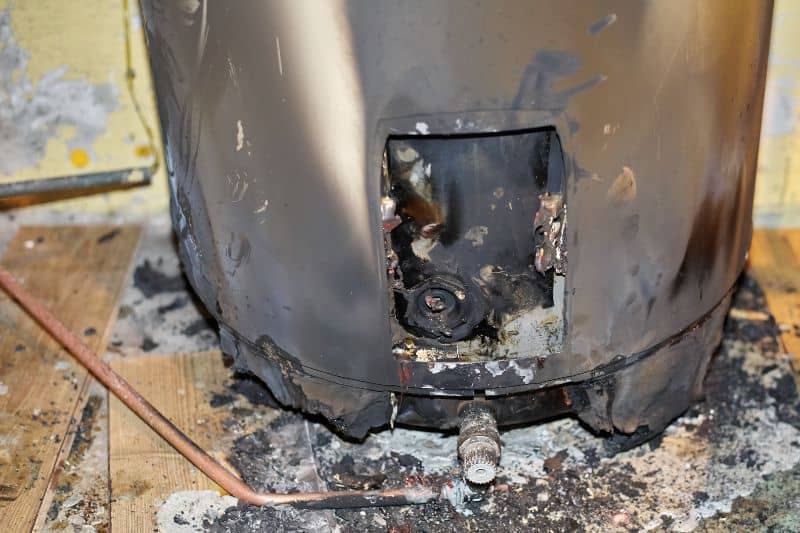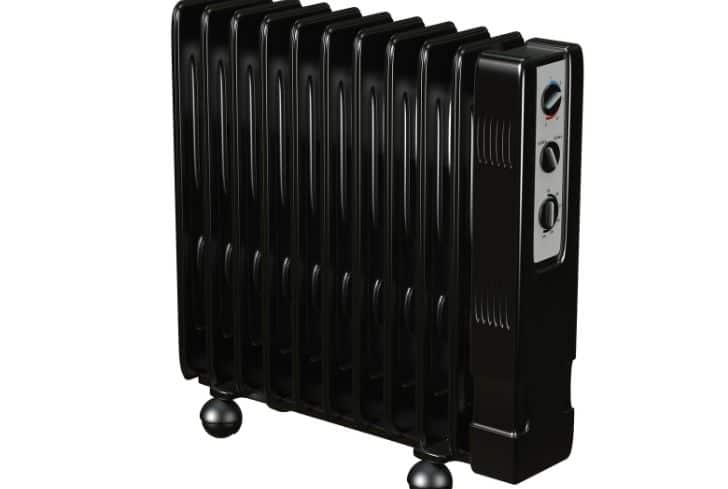Every year, after spring comes winter. Sometimes, the temperatures dip so low in certain areas that the only way to stay warm is to heat the house nonstop.
As a result, manufacturers have developed appliances that can effectively do the same while not adversely affecting the environment.
In comes oil heaters, which are convectional heaters used in domestic heating. They are filled with oil but are electrically heated. They also do not involve burning oil; the oil is used as a heat reservoir or buffer, not as fuel.
This article will describe oil-filled heaters vis-à-vis their environmental, social, and economic effects.
Do Oil Heaters Use a Lot of Electricity?
No, oil heaters don’t use a lot of electricity, although it depends on your understanding of ‘too much electricity’, how frequently you use the oil heater, and the temperature settings.
Generally, oil heaters use about 1500 watts of power, which could be a lot, or less, depending on how much heat you need for your home. Some mono-oil heaters use about 700W of power.
They do the job as normal-size oil heaters but are designed to heat rather small rooms or to keep your feet under your desk warm. Running the 1500W oil heater is equivalent to powering 3 desktop gaming computers or two vacuum cleaners simultaneously.
Are Oil Heaters Expensive To Run?
No, running oil heaters isn’t expensive. The heater will consume power at the selected rate when the element is on. If you pay the national average electricity rate of $0.12 per kilowatt-hour, you will pay $0.18 for every hour if the element runs at maximum power and about $0.10 per hour at the lowest setting.
Hence, running an oil heater costs the same as running a ceramic resistive heater with the same two power settings. Depending on your electricity rate and power settings, your oil-filled heater can cost anywhere from $0.04 to $0.3 per hour.
The difference between oil heaters and other space heaters, which makes them a bit better, is that they save energy as the power they consume is used to heat the oil, not the air.
The thermostat can monitor the oil temperature more efficiently than the thermostat in an exposed-element heater that can monitor the surrounding air.
Doing this guarantees the element will come on only when needed. The heat from the oil-filled coils still has to radiate into the air, eventually cooling the oil.
Although the heat radiates slowly, it helps keep the element off longer. The beauty of this is that you don’t have to pay for electricity every minute the element is off.
Are Oil Heaters Safe To Leave on Overnight?
Yes, oil heaters are safe to leave overnight for several reasons that we’re about to share with you. However, as you leave it on all night long, it’s always wise to exercise caution to avoid accidents.
The following are the reasons why leaving it on overnight is safe:
- They are designed to be very safe, and in contrast to other heaters, oil heaters do not expose any heating element. Their big metal surface does not get too hot to touch.
- Oil heaters have additional security features like built-in timers and tip-over protection, which ensure the appliance is safe, even when left unattended overnight.
- The oil heaters have no moving parts, meaning there is no noise from the appliance that can interrupt your sleep. As such, they are less likely to cause trouble as you sleep, meaning you can leave them overnight.
- The internal pressure of the oil stays constant since the oil has a high boiling point. Therefore, oil heaters can handle relatively high temperatures for an extended period, like overnight.
- The hot body does not get glowing red like infrared heaters, meaning it is safe to do anything close to it. They are not temperamental, and any modern heater worth its salt has safety shut-off switches in case it falls over or gets too hot.
- The thermostat monitors the temperature of the oil, not that of the room. This means the device will relay the signal to switch off the power when the oil reaches the targeted temperature and switch back on when the temperature falls below the cut-in temperature.

However, caution should always be taken because oil heaters will not always be safe to leave unattended overnight. Some have been known to explode when their thermal fuses fail to shut them off.
The result is fire, thick black smoke, unpleasant odors, oil on walls and other surfaces, and disfiguring scalding.
Some companies offer oil heaters with a fan to increase the airflow over the heater. Therefore, although they are technically safe to leave overnight, ensure they are working as they should.
Also, and this should go without saying, take all measures to ensure the oil heaters do not fail or cause fires.
If you can, use other ways to keep warm at night, rather than taking the risk with heaters that could cause fires and eventual death.
Do Oil Heaters Catch Fire?
Of course, oil heaters can catch fire. This happens if the thermal fuses fail to shut off the appliance as they should, causing it to overheat and explode. If not controlled early, fire, property damage, and death result.
In 2017, the Sunday Times reported a leak that happened on a Mellerware Nevada 11-fin oil heater.

The same year, Bunnings Australia was also forced to recall their Moretti 11 Fin Oil Column Heater after Product Safety Australia deemed the units unsafe, with reports of some ‘exploding’ and spraying hot oil.
On Christmas Day, a home in San Francisco, California, was filled with smoke, fire, and wrongful death because of a defective oil space heater. The space heater from De’Longhi Products became the focus of a wrongful death lawsuit after the fatal house fire near Golden Gate Park.
The company, by 2017, was facing 85 other lawsuits within the United States, where some cases involved deaths. Faulty and defective switches result in fires. That is why there were so many lawsuits against De’Longhi.
This prompted the company to evaluate their products, where they found over 3.5 million oil-filled radiator-type electric heaters manufactured between 1980 and 1988, which were faulty and had a defective switch.
How Long Do Oil Heaters Last?
Despite the appliance remaining on for quite some time, oil heaters can last up to 20 years. The life expectancy of an oil-filled heater is directly proportional to the internal temperature of the heating element.
According to Know The Flo, if the coil temperature remains between 750-1000 F throughout its operation, the heater can last anywhere from 16-20 years.
However, if the appliance is set to higher operating temperatures, the coil will deteriorate faster, and the oil heater can last between 10-15 years. Otherwise, it can theoretically last longer.
An oil heater’s lifespan is also determined by external factors such as mechanical damage, corrosion, and the on-off cycling of the heater.
If the heater is constantly exposed to mishandling or repeatedly turned on and off without respite to cool down, it will deteriorate faster.
Which is Better: An Oil Heater or An Electric Heater?
Whether or not an oil heater is better than an electric one depends on what you’re prioritizing on your unit. Generally, the oil heater is more energy efficient, quieter, and healthier, especially for individuals with allergies. However, they cost more and will take longer to heat than electric heaters.
Generally, choosing between oil heaters and electric room heaters can be a real conundrum. But as long as you know what you need, deciding what heater type to buy shouldn’t be a problem.
So, which of them is the ideal choice for you?
Well, let’s evaluate the two types based on several parameters:
1. Energy-efficiency
Oil heaters are more energy-efficient than electric heaters. They retain heat well and switch off automatically when they reach desired temperatures. This, in turn, can save you a ton of energy, using low power to maintain the warmth.
On the other hand, electric heater relies on spreading heat through the air, meaning they lose heat quickly and are not energy efficient. Any bad installation or drafty windows could also mean losing the heat faster.
2. Cost of Purchase
A standard electric fan heater is cheaper than oil heaters. This could primarily be because they are produced in mass numbers, meaning there is tons of competition, meaning lower prices.
The oil heaters cost more than standard electric heaters, although they save you money in the long run.
3. Saving Money
Their high heat retention makes oil heaters stay hot for hours after switching off.
They are great for saving energy and money, especially if you are to leave them up at night.
The standard electric fan heaters lose heat efficiently and quickly, meaning higher electricity bills.
4. Silence While At Work
The electric heaters are noisy, especially if they have fans. The noise might not be much, but it is enough to disrupt your peaceful night’s sleep.
On the other hand, the oil heaters are silent since all the heat comes from heating the oil, meaning there are no sounds with these heaters.
Therefore, They are best for bedrooms as they will not wake you up or put you at any immediate risk.
5. Safety
Both appliances can be considered safe for kids, although electric heaters might be safer. The majority are not overly hot to the touch, and the noise shows it is on and hot. The oil heaters are, however, advantageous as they are safer for fires.
Fan heaters for the former, if blocked, can lead to a fire hazard, but with oil heaters, they do not have risks if there are curtains or clothes ‘accidentally’ blocking them, making them overall safer for fires.

They can only result in fires if their switches have malfunctioned or are defective, causing the appliance to overheat, resulting in fires.
6. Quickness in Their Operations
Electric fan heaters are faster in heating a room as they can do it in minutes. Their fans quickly spread the heat throughout the air of the space.
Oil heaters are slow to heat and can take up to 30 minutes to warm a room. However, the advantage is that the heat can last a lot longer than that from electric heaters.
7. Health concerns
Electric fan heaters result in air movement that could bring dust and allergies into the air. As such, they are not ideal for people with such health conditions. Oil heaters are safe for such individuals in general.
8. More Options
There are thousands of electric fan heater models to choose from. Therefore, you will likely find a model that fits your choice and taste.
The choices for oil heaters are limited, and you must compromise with the available appliances.






